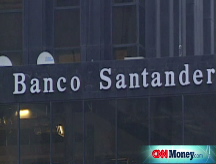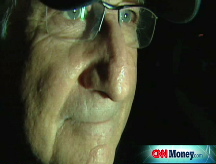A parade of Ponzis
The boom years were the perfect time for Ponzi schemers, and now the time is ripe for them to blow up.
(Fortune) -- At the height of his popularity in July 1920, Charles Ponzi arrived at his Boston office to a terrible surprise: A copycat business had set up shop down the hall, siphoning off his customers by offering the same eye-popping returns that had made Ponzi the most talked-about man in America.
Ponzi knew that his competitors were frauds -- he had already learned the hard way that it wasn't possible to double investors' money in 90 days. The only way to make good on that promise was to secretly use money from new investors to pay notes that had come due, the old rob-Peter-to-pay-Paul scheme that would eventually bear Ponzi's name.
Ignoring the irony of the situation, Ponzi called the cops.
The crush of publicity surrounding Ponzi's alleged modern heir, Bernard Madoff, has resulted in a similar reaction, leading to a wave of arrests and flights by suspected swindlers and schemers who've become known as "mini-Madoffs."
Three main factors have led to the sudden Ponzification of American finance. Regulators and prosecutors are making financial scams a priority, pouncing on complaints with new vigor. Second, worried investors who had been enjoying too-good-to-be-true returns have begun wondering if they are in the grips of Madoff Madness, so they demand their money, only to learn that the money or its caretaker have disappeared. And third, the economic crisis is making it difficult for scammers to find new investors, proving that when the tide goes down, the rocks on the bottom show up.
This week, authorities arrested alleged Ponzi schemers Nicholas Cosmo of Long Island, N.Y., and Arthur Nadel of Sarasota, Fla., adding their names to a recently crowded rogues' gallery of suspected swindlers everywhere from Philadelphia to Atlanta to Texas to Idaho, with more sure to follow.
The Securities and Exchange Commission doesn't keep statistics on investigations of Ponzi schemes, but The Wall Street Journal reported that the agency filed at least 23 new cases last year, up from 15 a year earlier, with four already on the books in 2009. That trend will certainly continue, especially if Congress passes legislation introduced last week to add $110 million to enforcement efforts by the FBI, the SEC and federal prosecutors.
But just because more attention is being paid -- every newly exposed Ponzi scheme is now worth a few headlines -- doesn't necessarily mean there are suddenly more swindles, only that more are being unearthed.
The moment a goldsmith minted the first coin, someone else was probably figuring out a way to slide it out of the folds in the owner's toga. It's long past time to accept that scams are hard-wired in human nature (in fact, researchers have gone beyond humans, demonstrating deceit by animals in pursuit of more elemental needs than money: food, sex and survival).
Whether momentary or permanent, new enforcement crackdowns will only catch scammers when they're already up and running, risking investors' money. The real focus, then, should be on the only foolproof remedy for swindlers: Cut off their blood supply. That is, eliminate or vastly reduce the combustible combination (think dollars being burned) of gullibility and greed among investors/victims.
Individuals and institutions that suffered devastating financial losses deserve sympathy, especially those whose money was surreptitiously funneled to Madoff or other allegedly dodgy operators. But sympathy wears thin for those who gave all or most of their savings to a single financial manager, didn't research or understand how their money was being invested, or never doubted that their relatively small-time advisor could so routinely beat the market.
Call it the "Harvard endowment" rule: Harvard's money managers are widely considered some of the best in the business, and still this year they reportedly may lose up to 30% of the university's endowment. For starters, why don't investors ask: If my guy in Idaho is so much smarter, why isn't he working for Harvard?
When Charles Ponzi's scheme collapsed, The New York Times delivered a memorable rebuke to his investors: "Perhaps the disinclination for being harsh in characterizing Ponzi is due to lack of any sympathy for those whom he robbed. ... They showed only greed -- the eagerness to get much for nothing -- and they had not one of Ponzi's redeeming graces."
The same might be said for Ponzi's down-the-hall copycats -- who, like him, ended up in prison. More importantly, it also applies to their investors, then and now, who share blame for allowing history to repeat itself.
Mitchell Zuckoff is a professor of journalism at Boston University and the author of "Ponzi's Scheme: The True Story of a Financial Legend." ![]()
-
 The retail giant tops the Fortune 500 for the second year in a row. Who else made the list? More
The retail giant tops the Fortune 500 for the second year in a row. Who else made the list? More -
 This group of companies is all about social networking to connect with their customers. More
This group of companies is all about social networking to connect with their customers. More -
 The fight over the cholesterol medication is keeping a generic version from hitting the market. More
The fight over the cholesterol medication is keeping a generic version from hitting the market. More -
 Bin Laden may be dead, but the terrorist group he led doesn't need his money. More
Bin Laden may be dead, but the terrorist group he led doesn't need his money. More -
 U.S. real estate might be a mess, but in other parts of the world, home prices are jumping. More
U.S. real estate might be a mess, but in other parts of the world, home prices are jumping. More -
 Libya's output is a fraction of global production, but it's crucial to the nation's economy. More
Libya's output is a fraction of global production, but it's crucial to the nation's economy. More -
 Once rates start to rise, things could get ugly fast for our neighbors to the north. More
Once rates start to rise, things could get ugly fast for our neighbors to the north. More









